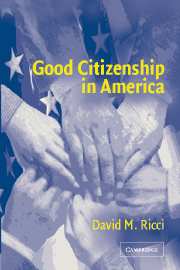1 - The Concept of Citizenship
Published online by Cambridge University Press: 06 July 2010
Summary
Some features of American politics stand out clearly. There are fifty states, which exercise substantial powers according to the Constitution. Congress has two houses, one with 435 members, the other with 100, and both must agree before bills can become national laws. The president serves a four-year term, and perhaps another, is charged with administering various government agencies, and has a commanding role in foreign affairs. The federal courts work through districts and circuits, and the Supreme Court sits in a marble palace in Washington. The details are endless, but one knows more or less what to look for and where.
Good citizenship is less tangible, more difficult to study, and sometimes overlooked in the national roster of political institutions. Americans admire good citizenship. But they are not always sure what citizens should do on behalf of the communities in which they live. This is so even though many people believe that, when civic practice does not measure up to its ideal, a vital element is missing from the national landscape.
In truth, the concern for good citizenship, no matter how imprecisely defined, takes aim at something very important. That is, Americans understand not only that government officials should work properly but also that citizens must help assure the quality of public life. The point is self-evident: In a democracy citizens rule, yet if they rule badly, all will suffer.
- Type
- Chapter
- Information
- Good Citizenship in America , pp. 3 - 18Publisher: Cambridge University PressPrint publication year: 2004



